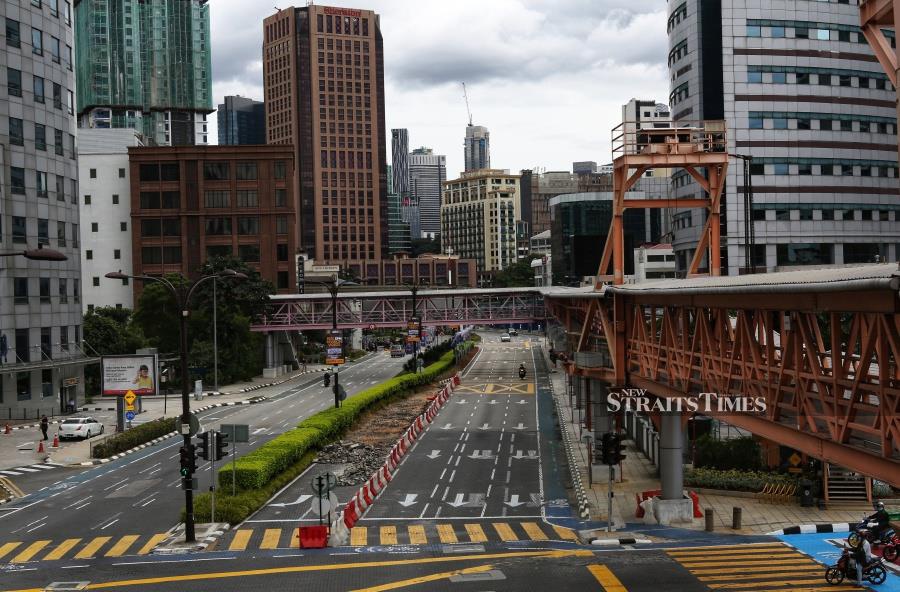
THE pandemic and extended lockdowns have come at a heavy cost to lives and livelihoods since last year.
As there is still no light at the end of the tunnel, the government must focus on what matters most for the people and the nation. As it stands, Malaysia's economic condition is dire.
The gross domestic product recorded a seasonally adjusted quarter-on-quarter contraction of two per cent in the second quarter, weighed down by the national lockdown measures imposed from May to June.
And given the tighter restrictions after June because of the surge in daily number of Covid-19 cases, this would pose further downside risks to the pace of economic recovery.
S&P Global Ratings just downgraded its 2021 growth forecast for the country from 4.1 per cent to 3.2 per cent on account of the prolonged lockdown, which led to subdued domestic demand.
Additionally, the re-imposition of the Full Movement Control Order (FMCO) in early June has led to further deterioration in the labour market.
The unemployment rate rose to 4.8 per cent that month after registering a partial recovery in the four preceding months.
Worse, the Statistics Department's household income estimates show that 20 per cent of M40 households fell into the B40 income group, and 12.8 per cent of T20 households fell into the M40 category because of the economic contraction.
This downward shift within the household income groups is evidence that the pandemic has not spared anyone.
These statistics should serve as clear indicators for the new government on what needs to be done. The state of political instability should not be an excuse to pause or stop policy measures.
The government's recovery plan should focus on two key priority areas.
FIRST, the gradual reopening of economic sectors under the National Recovery Plan (NRP) is welcomed as it will alleviate the burden on many people.
This is due to the critical need to address the issues of high unemployment and continued closure of businesses, especially among small- and medium-scale enterprises (SMEs), but this move needs to be coupled with extra vigilance over the rise of new virus variants.
Although it is still too early to gauge how fast the economy will be able to recover, the recent progress of the Covid-19 National Immunisation Programme, where more than 50 per cent of adults in the country have been fully vaccinated, is expected to facilitate recovery.
Nonetheless, constant monitoring on the national inoculation pace is required as our vaccination rate is still low compared with other countries, such as Singapore.
Perhaps Malaysia can learn from the city-state that has been at the forefront when it comes to Covid-19 detection and containment measures, as well as vaccination rollout.
Up to the middle of this month, Singapore has fully vaccinated 73.1 per cent of its population, the highest in Asean. The substantial drop in its daily Covid-19 cases has also allowed the government to ease restrictions and jump-start the economy.
SECOND, there is a need to ensure smooth distribution of existing assistance and to ensure that essential spending is not jeopardised because of the change in government.
Given the hardship that the people have faced, short-lived and narrow-minded policies prioritising political interests would be the last thing the people need now.
Cash assistance and food baskets to help households make ends meet and put food on the table, immediate assistance for SMEs to remain afloat, such as wage subsidies and grants, should reach the beneficiaries as planned. More importantly, exclusion errors in the provision must be minimised.
Surveys have shown that both households and businesses prefer financial assistance over other types of assistance, suggesting how dire the situation is. So, effort must not be wasted in reinventing the wheel.
During this unprecedented twin crisis, lives and livelihoods should be the utmost priority of the incoming government. This is why we must set aside political differences to execute these key priority areas.
The writer, Sofea Azahar is a senior researcher at the Institute of Strategic and International Studies (ISIS) Malaysia
-NST



No comments:
Post a Comment
Note: Only a member of this blog may post a comment.